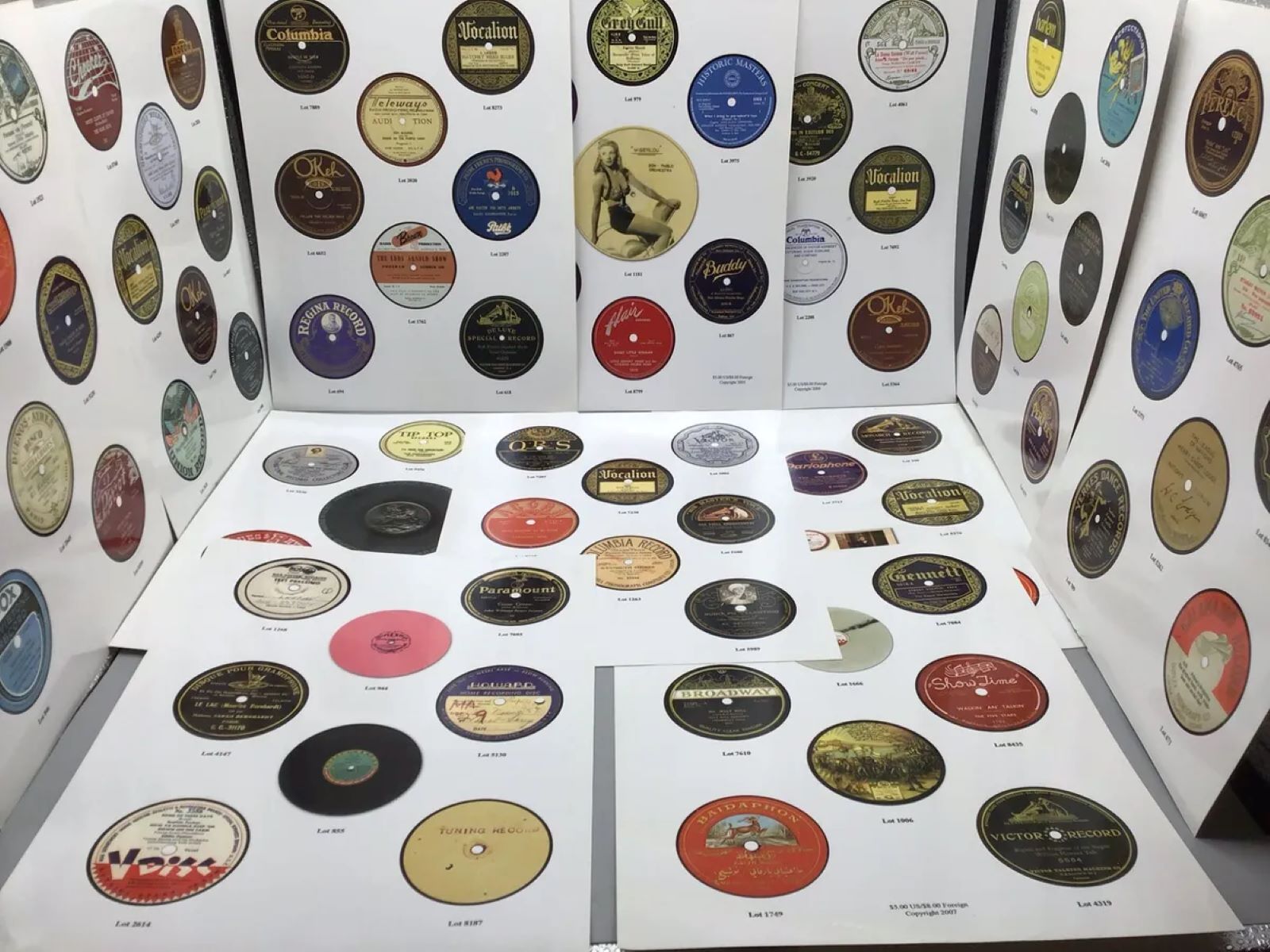Home>Production & Technology>Record Label>What Is The Biggest Record Label In The World?


Record Label
What Is The Biggest Record Label In The World?
Published: January 24, 2024
Discover the largest record label in the world and explore the dynamic industry of music with this informative guide. Learn about the powerhouses dominating the record label scene.
(Many of the links in this article redirect to a specific reviewed product. Your purchase of these products through affiliate links helps to generate commission for AudioLover.com, at no extra cost. Learn more)
Table of Contents
Introduction
A record label is a crucial entity in the music industry. It is responsible for discovering, nurturing, promoting, and distributing musical talent to the masses. Record labels play a significant role in shaping the careers of artists and are instrumental in the success of their music. Over the years, the music industry has witnessed the rise and fall of various record labels, with some attaining massive global success and recognition.
In this article, we will explore the concept of record labels and delve into the question: what is the biggest record label in the world? We will examine the criteria used to determine the size of a record label and highlight some of the major players in the industry.
A record label serves as the middleman between the artist and the consumer. It takes care of the production, manufacturing, marketing, distribution, and promotion of an artist’s music. Additionally, record labels often provide artists with financial support, studio facilities, production teams, and marketing campaigns to help them reach a wider audience.
Record labels can be categorized into two main types: major labels and independent labels. Major labels are typically large conglomerates with significant financial resources and extensive industry connections. Independent labels, on the other hand, are often smaller and more focused on niche genres or local scenes.
Now let’s explore the criteria commonly used to determine the size and success of a record label.
Definition of a Record Label
A record label is a company or organization that manages and promotes music recordings, typically specializing in the production, distribution, and marketing of music. It acts as a bridge between artists and their audience, handling the business aspects of music production to ensure that the artists’ work reaches a wide audience.
The primary role of a record label is to discover and sign talented artists or bands, negotiate contracts, and finance the production, recording, and marketing of their music. Record labels often provide artists with the necessary resources and expertise to create professional recordings, including access to recording studios, producers, sound engineers, and session musicians.
Once the music is recorded, the record label is responsible for the distribution and promotion of the music. This includes manufacturing physical copies such as CDs, vinyl records, and cassettes, as well as digital distribution on platforms like streaming services and online music stores. Record labels also handle marketing campaigns, public relations, and advertising to generate awareness and interest in the artists and their music.
In addition to managing the production and distribution aspects, record labels often offer artists financial support in the form of advances. These advances help cover the costs of production, marketing, and tour expenses. The record label recoups the advances and other expenses from the artists’ earnings through sales and royalties.
Record labels vary in size and scope. Major record labels are typically massive conglomerates with global reach, while independent labels are smaller companies focused on specific genres or niche markets. The structure and operations of record labels have evolved with the advent of digital music platforms, with many labels now expanding their services to include artist management, publishing, and licensing.
Record labels play a crucial role in the music industry by not only providing a platform for artists to showcase their talent but also by investing in their success and helping them navigate the complex world of the music business.
Criteria for Determining the Biggest Record Label
When determining the biggest record label in the world, several criteria are considered to assess their size and influence in the music industry. While there’s no one definitive way to measure the “bigness” of a record label, some key factors are commonly used to evaluate their prominence:
1. Market Share: Market share refers to the portion of the music market that a record label controls. It is usually calculated based on factors such as sales, streaming numbers, and revenue generated from music releases. The larger a record label’s market share, the bigger its presence in the industry.
2. Financial Revenue: The financial revenue generated by a record label is another essential criterion. This includes income from record sales, digital downloads, streaming royalties, licensing deals, and other revenue streams. A record label with higher revenues is usually considered bigger and more influential.
3. Artist Roster: The caliber and size of a record label’s artist roster also play a significant role in determining its prominence. A label with a diverse and talented roster of popular artists is likely to have a more significant impact on the industry.
4. Global Reach: The international reach and presence of a record label are important indicators of its size. A label that has operations, distribution networks, and artist signings across multiple countries and continents is generally considered to be bigger.
5. Industry Recognition: Recognition and accolades within the music industry can also contribute to a record label’s status. Awards, nominations, and critical acclaim received by artists signed to a label can reflect on its overall reputation and influence.
It is worth noting that the rankings of record labels can vary based on the specific criteria used and the time frame considered. Market conditions, industry trends, and changes in music consumption patterns can significantly impact a label’s standing.
Now that we understand the criteria for determining the size of a record label, let’s explore some of the major record labels in the industry that have achieved notable success and recognition.
Major Record Labels
The music industry is dominated by a few major record labels that have established themselves as powerhouses in the global music market. These labels have a wide-reaching influence and are responsible for managing some of the biggest artists in the industry. Let’s take a closer look at some of the major record labels:
-
Universal Music Group:
Universal Music Group (UMG) is often regarded as the largest record label in the world. It has an extensive roster of artists across various genres, including Taylor Swift, Drake, Lady Gaga, and Kendrick Lamar. UMG operates numerous subsidiary labels and divisions, making it a force to be reckoned with in the industry.
-
Sony Music Entertainment:
Sony Music Entertainment is a global music company and one of the top record labels. It boasts a diverse range of artists, including Beyoncé, Travis Scott, Adele, and Justin Timberlake. Sony Music Entertainment encompasses multiple record labels under its umbrella, such as Columbia Records, RCA Records, and Epic Records.
-
Warner Music Group:
Warner Music Group (WMG) is another major player in the record label industry. It represents an impressive lineup of artists, including Ed Sheeran, Bruno Mars, Cardi B, and Dua Lipa. WMG is home to various record labels, including Warner Records, Atlantic Records, and Elektra Records.
These major labels have substantial resources, global reach, and extensive industry connections, allowing them to invest in talent and provide the necessary support for artists to thrive. They have a significant impact on shaping the industry’s trends and have a powerful influence on the direction of popular music.
While major labels dominate the industry, it’s important to note that there are also numerous independent record labels that have achieved considerable success and recognition. These independent labels often cater to niche genres and are known for their ability to discover and nurture unique talent.
In the next section, we will explore the world of independent record labels and their contributions to the music industry.
Universal Music Group
Universal Music Group (UMG) is considered the largest record label in the world, boasting an impressive roster of artists and an extensive global reach. Founded in 1934, UMG has grown to become a powerhouse in the music industry with a diverse range of record labels and subsidiaries under its umbrella.
UMG represents some of the biggest names in music across various genres, including pop, rock, hip-hop, R&B, and more. Artists signed to UMG include global superstars like Taylor Swift, Drake, Lady Gaga, Kendrick Lamar, Billie Eilish, and many others.
One of the key strengths of UMG is its ability to provide artists with a wide range of resources and support. The label has an extensive worldwide network that allows for effective distribution and marketing of music releases. UMG also offers artists access to state-of-the-art recording facilities, top-notch producers, and an expert team of industry professionals who work to maximize the artists’ success.
Another notable aspect of UMG’s success is its ability to adapt to the evolving music landscape. The label has embraced digital platforms and streaming services, ensuring that its artists’ music reaches a wide audience across multiple platforms. UMG has also established strategic partnerships with technology companies to explore new avenues for music distribution and promotion.
In addition to its dominance in the music industry, UMG has made significant strides in areas such as music publishing, merchandising, and artist management. This diversified approach further solidifies its position as a major player in the entertainment business.
With its rich history, vast artist roster, global reach, and commitment to innovation, Universal Music Group continues to shape the music industry and set new standards for success.
Sony Music Entertainment
Sony Music Entertainment is one of the leading record labels globally and a major player in the music industry. Established in 1929, Sony Music Entertainment has built a reputation for representing top talent and delivering hit records across various genres.
The label is home to a diverse roster of artists, including some of the biggest names in the music industry. Artists such as Beyoncé, Travis Scott, Adele, Justin Timberlake, and many more have found success under Sony Music Entertainment.
One of Sony Music Entertainment’s strengths lies in its ability to leverage its influential record labels under its umbrella. These labels include Columbia Records, RCA Records, Epic Records, and many others. Each label has its unique identity and caters to different genres and markets, providing a wide range of opportunities for artists to thrive and develop their careers.
With a vast global distribution network, Sony Music Entertainment ensures that its artists’ music reaches fans all around the world. The label has strong partnerships with digital platforms and streaming services, allowing for maximum exposure and accessibility to the artists’ music.
In addition to its success in music production and distribution, Sony Music Entertainment has expanded its reach into other areas of the entertainment industry. The label has made significant strides in music publishing, artist management, and licensing, helping further enhance its presence and influence in the market.
Sony Music Entertainment is known for investing in cutting-edge technologies and innovative approaches to connect with audiences. The label actively explores new ways to engage fans, such as interactive experiences, virtual concerts, and strategic partnerships with brands and companies.
With its rich history, diverse artist roster, global distribution power, and commitment to innovation, Sony Music Entertainment continues to make an impact in the music industry, delivering chart-topping hits and shaping the future of popular music.
Warner Music Group
Warner Music Group (WMG) is a prominent record label and one of the major players in the music industry. Founded in 1958, WMG has a rich history and a strong reputation for fostering talent and delivering hit records across various genres.
WMG is home to a diverse roster of artists, ranging from established legends to emerging talents. The label represents artists such as Ed Sheeran, Bruno Mars, Cardi B, Dua Lipa, and many others who have achieved significant success and recognition worldwide.
One of the key strengths of Warner Music Group is its vast portfolio of record labels. These labels include Warner Records, Atlantic Records, Elektra Records, and many others, each with its own unique identity and specialization in specific genres. This diverse range of labels allows Warner Music Group to cater to a broad spectrum of musical tastes and engage with a wide variety of audiences.
WMG’s global reach is a significant factor in its success. The label has a strong presence and distribution network spanning multiple countries, enabling its artists’ music to reach fans all around the world. In addition, Warner Music Group has established strategic partnerships and collaborations with international artists, expanding its influence and cultural impact.
Warner Music Group has also embraced technology and digital platforms, recognizing their importance in today’s music industry. The label actively collaborates with digital streaming services and explores innovative ways to connect with audiences, including creating immersive music experiences and utilizing social media platforms to engage with fans.
In addition to its success as a record label, Warner Music Group has diversified its operations by expanding into music publishing, artist management, and licensing. This holistic approach allows WMG to provide comprehensive support and resources to its artists, nurturing their careers and helping them achieve long-term success.
With its rich heritage, extensive artist roster, global reach, and commitment to embracing new technologies, Warner Music Group continues to be a major force in the music industry, shaping popular music and contributing to the ever-evolving music landscape.
Independent Labels
While major record labels dominate the music industry, independent labels also play a crucial role in shaping the landscape of the music world. Independent labels are characterized by their ability to focus on niche genres, foster unique talent, and provide a platform for artists who may not fit the mainstream mold.
Independent labels operate with a level of autonomy and flexibility that allows them to explore diverse musical styles and take risks that major labels may be more hesitant to undertake. They often have a close-knit and personal approach to working with artists, offering a collaborative environment where artists have more creative control over their music.
Since independent labels are not tied to corporate conglomerates, they can prioritize artistic integrity and cultivate a loyal fanbase within specific music communities. This allows independent artists to maintain their unique sound and attract audiences seeking alternative and underground music experiences.
Despite their smaller size and resources compared to major labels, independent labels have experienced significant success in recent years. Many independent artists have achieved chart-topping hits, critical acclaim, and even Grammy awards through the support of their independent labels.
One of the strengths of independent labels is their adaptability and ability to embrace new digital platforms and innovative marketing strategies. They often leverage social media, online music platforms, and direct-to-fan engagement to connect with their target audience. These labels also frequently host live shows and events, showcasing their artists in intimate and authentic settings.
Independent labels are also known for their role as tastemakers, introducing fresh and cutting-edge music to the industry. They have the freedom to experiment, sign emerging artists, and champion unique musical movements that may eventually influence mainstream music trends.
Some notable independent labels include Rough Trade Records, Sub Pop Records, XL Recordings, and Epitaph Records, among many others. These labels have launched the careers of iconic artists such as Radiohead, Nirvana, Adele, and The Offspring, highlighting the influential role independent labels have played in shaping popular music.
Overall, independent labels offer an alternative pathway for artists to find success and reach their target audience without sacrificing artistic integrity. They celebrate diversity, nurture creative visions, and contribute to the vibrancy and innovation of the music industry.
Conclusion
The world of record labels is vast and diverse, ranging from major conglomerates to independent labels. These labels play a crucial role in discovering, nurturing, promoting, and distributing music to audiences worldwide.
When determining the biggest record label in the world, several criteria come into play, including market share, financial revenue, artist roster, global reach, and industry recognition. These factors help gauge the size, influence, and success of a record label in the music industry.
Universal Music Group (UMG), Sony Music Entertainment, and Warner Music Group (WMG) are three major record labels that dominate the industry. These labels represent a myriad of well-known artists and boast global reach, financial stability, and extensive resources to support their artists’ careers.
Additionally, independent labels play a significant role in shaping the music landscape. These labels prioritize artistic integrity, offer more creative freedom to artists, and focus on niche genres, introducing unique and alternative music to audiences. Independent labels have proven that they can achieve notable success and make a lasting impact in the industry.
In conclusion, the biggest record label in the world can be determined by a combination of factors such as market share, financial revenue, and artist roster. While major labels like UMG, Sony Music Entertainment, and WMG dominate in terms of resources and global reach, independent labels add an element of innovation, diversity, and artistic freedom to the music industry. The influence and success of a label ultimately lie in its ability to connect artists with audiences, foster creative growth, and deliver captivating music experiences.











